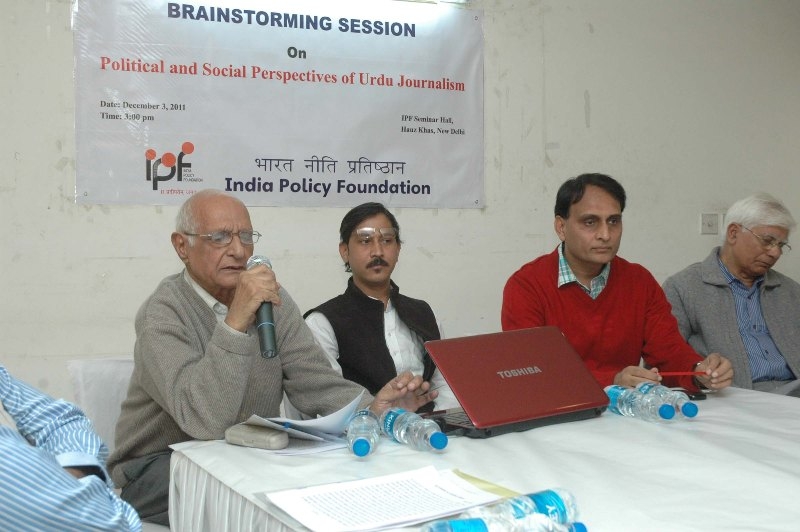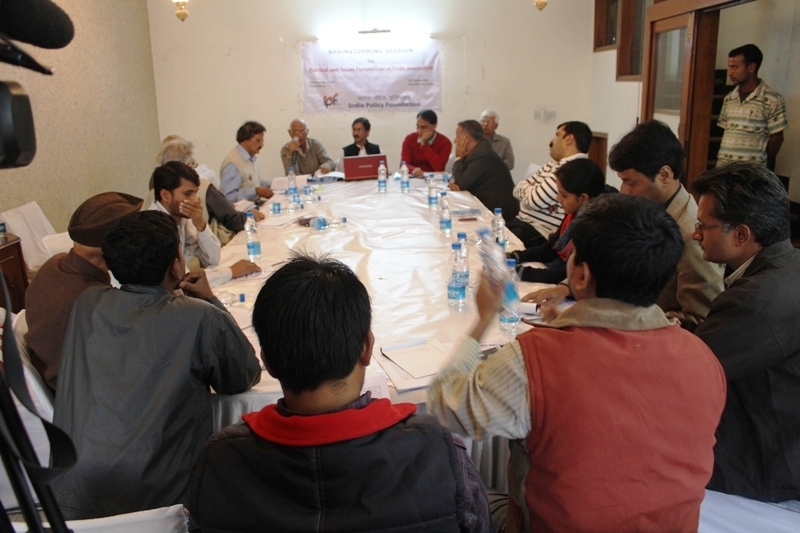Political and Social Perspectives of Urdu Journalism
Total Views |

Dec 3, 2011, IPF Seminar Hall
Chaired by: Syed Asdar Ali, Resident Editor, Qaumi Tanzeem
Speaker: Sh. Manmohan Sharma, Senior Journalist
He gave the example of the news published by these papers of recent communal riots in Rudrapur and Bharatpur. They not only violated the norms set by the Press Council of India but also tried to create mistrust and feuds between religious communities. He said that the objective of research on the topic is to critically examine their role as an important component of the Fourth Estate. Media of all shades must be inclusive in their approach. They must avoid news and views which create provocation, weaken nationalist feeling and damage social harmony, he said. The gensralisation that Urdu newspapers get only one percent advertisements from the DAVP is wrong as it conveys that they are discriminated. However, the fact is altogether different. Their popular newspapers get adequate advertisements but how can those which are published merely for the sake of publication. He gave an example of more than a dozen newspapers being published from a small area in Delhi, Lakshminagar.
The IPF has also been undertaking translation of select reports from the 25 main Urdu newspapers in the country for the last three years and has now started sending reviews of Urdu press across to needy people on a fortnightly basis, Prof Rakesh Sinha said in his introductory speech.

Sh. Manmohan Sharma and Sh. Satish Pednekar presented their interim papers on the work so far done under the project on Urdu media, started nine months ago. Narrating the growth and development of Urdu and Urdu press in India, Sh. Manmohan Sharma said the media had made their share of contribution to India’s freedom struggle. However, he said, papers run by political parties came a cropper by 1990s, Quami Awaz editions of Lucknow and New Delhi published by Associated Journals founded by Jawaharlal Nehru being examples. Today, major part of Urdu print media business has gone into the hands of corporates such as Sahara India and Dainik Jagran.
Sh. Satish Pednekar, presenting his paper, observed that Urdu media too had a role in India’s Partition, since that language became the identity for the Muslims. Finding fault with its narrow perspective of dealing with the concerns of one community alone, although living without any regional exclusiveness, he said the media by and large has lost the professional moorings. Distortions have crept in in the selection of news. Even news of national and international importance gets lopsided treatment, with the result that even bigger issues like budget or planning are seen from the perspective of the community’s own benefits only. The media is in the grip of a persecution mania as also the community. A strict adherence to fundamentalism has blocked technology and modernism from benefiting the community, he added.
Participating in the discussion, Mansur Alam, former editor on UNI Urdu news service, said the deterioration in the standards of Urdu media is due to commercialisation of the fourth estate as also seen in other language papers. Earlier, especially during freedom struggle, journalism was a dedicated mission. He lamented the recent decline in Urdu readership. Its performance, for example, in UP with a population of nine million people speaking Urdu, is poor today, although it is set to flourish in places like Hyderabad. He said as production became easier after the technological revolution, corporate houses have entered the Urdu media business. He suggested only continuous dialogue and giving them a sense of belonging can solve the problem of Muslim alienation from the mainstream.
Prof Rajvir Sharma said the Urdu press has to uphold equity, instead of promoting the rights of only one community, their exclusiveness and divisiveness. They should, instead, talk of India first. The Urdu media should highlight issues of general social and national importance and join the mainstream.
Mohammad Jamshed Hasan, Assistant General Manager–marketing of Urdu daily Inquilab, said Urdu readership is declining but there are good prospects for business. He sees that the Muslims’ economic condition is by and large improving and their life style too is undergoing change of late under the impact of modernisation. Sushil Pandit said Muslims are using Urdu as their identity. He lamented, how a Tamil or Kannad speaking Muslim declares his mother-tongue Urdu? In a way they have been using Urdu as a tool for that. Such things destroy indigenous culture, he said. He said there is another interesting instance of Urdu being used as sectarian identity of Muslims. Kashmiri is a part of the 8th Schedule in the Constitution of India. However, in Kashmir there is no trace of Kashmiri language, even at primary level it is not being taught! Instead, Urdu has been given importance. Why? is a big question to ponder upon. “Is it not against the indigenous values, norms and culture?”, he asked.
Syed Asdar Ali criticized Urdu newspapers for using their space to create gulf between communities. Their policy and priority to select news is bone of contention, he said. He gave an instance of one of the largest circulated Urdu dailies giving a banner headline on the first page to a news on insult of a religious book in Hyderabad. Does it deserve so much importance and space? And, Is there no other national news more important than this on the day?, he asked. Jitender Kumar Sharma, GD Sharma, Ashok also expressed their views. Sushma Wahengbam welcomed the guests and Jayram Viplav delivered the vote of thanks and said that his experience in the Jamia Millia shows there is a systematic effort to impress Muslims to identify themselves with Urdu as their mother-tongue.